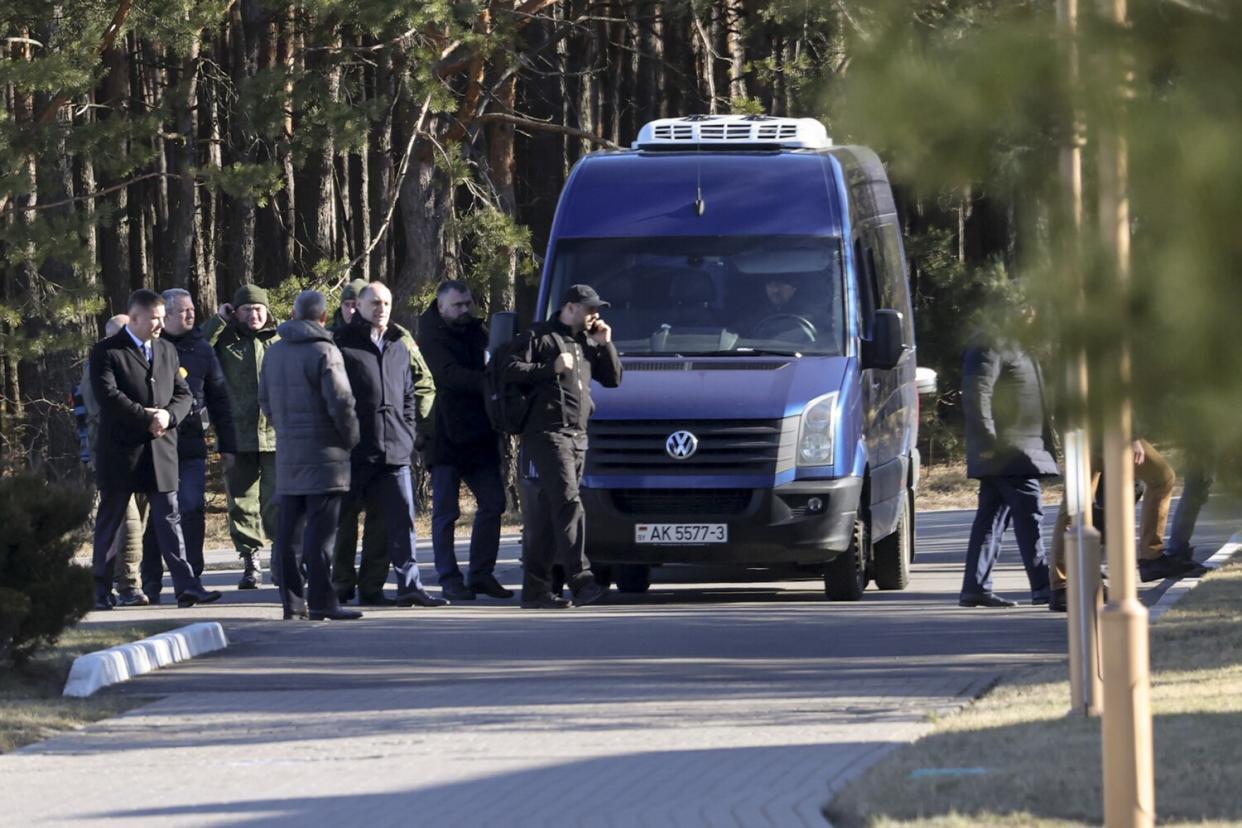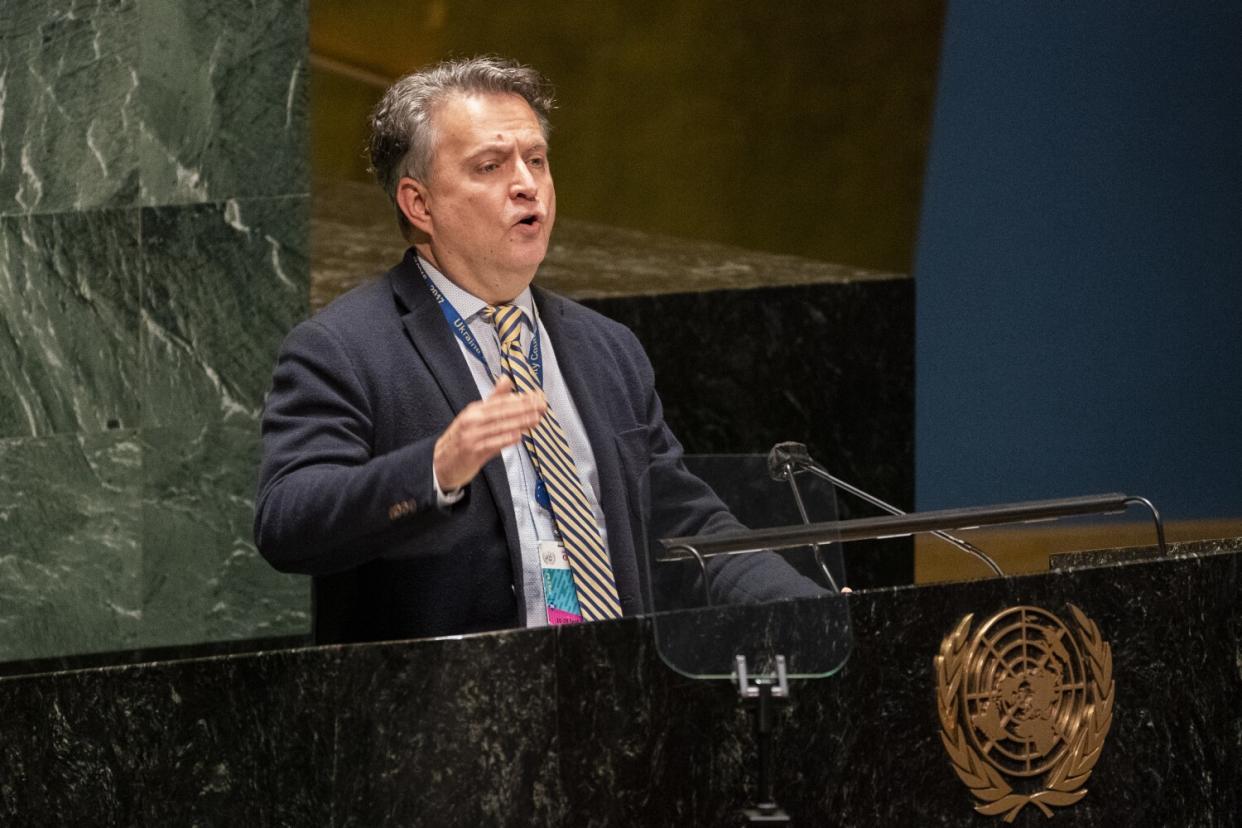Russian missiles pound Kharkiv as Ukraine talks bring no breakthrough
Russia and Ukraine's first round of talks Monday failed to ease Europe's biggest ground war in 75 years as Russian missiles pounded Ukraine's second-largest city, troops pressed closer to the capital, Kyiv, and more than half a million Ukrainians fled the country.
International efforts to punish and isolate Russian President Vladimir Putin intensified and took aim at his country's most important finances. Even traditionally neutral Switzerland joined the growing coalition of nations imposing a raft of sanctions on Putin and associates, demanding Russia withdraw its troops immediately.

But Putin seemed to remain impervious to the pressure and insisted Russia was not targeting civilians in its attacks despite abundant evidence to the contrary. Rather than back down, Putin may be driven to increasingly brutal tactics, several experts warned.
Also Monday, the U.S. announced that it was expelling 12 "intelligence operatives" from the Russian Embassy to the United Nations. The dozen were engaging in activities not consistent with their stated positions as diplomats, the U.S. mission to the U.N. said — code for espionage. The expulsion was not related to Ukraine but comes at a time of the most tense U.S.-Russian relations in decades.
Ukrainian President Volodymyr Zelensky agreed to the Monday negotiations, despite seeing “small chance to end the war,” and said the fate of his country as an independent nation had now entered a “crucial period.”

Delegations from Ukraine and Russia met for about five hours at a site near the border between Ukraine and Russia ally Belarus, and they agreed to hold another round of talks. But diplomats portrayed a wide chasm nowhere near resolution: Ukraine is demanding a cease-fire and withdrawal of Russian troops, while Russia wants a "demilitarization" of Ukraine and pledge of neutrality, meaning it must step away from the West.
In Kyiv, a two-day-long curfew was lifted Monday to allow residents to venture out cautiously to replenish supplies, get some fresh air and survey the state of their city of nearly 3 million people. Many lined up for hours outside gas stations and supermarkets, mostly ignoring the occasional wail of air-raid sirens.

Fighting continued on the outskirts of the capital, with satellite images showing Russian troops mostly massed about 15 to 19 miles north of the city, according to U.S. and British defense officials. No major population centers have yet fallen to Russian forces, prompting fears that Putin will soon order an all-out blitz against Ukraine, depose its government and turn it into a vassal state.
“They have been slowed and they have been frustrated by their lack of progress on Kyiv, and one of the things that could result is a reevaluation of their tactics, and the potential for them to be more aggressive and more overt in both the size and scale of their targeting of Kyiv," a senior Pentagon official said.
Zelensky once again called on his compatriots to defend their land.
“When I planned to become a president, I said that each of us is the president, because we are all responsible for our state, for our beautiful Ukraine,” Zelensky said in a video address Monday, the latest in a series of public messages that has buoyed and drawn the admiration of many of his people. “Now it has happened that each of us is a warrior.... And I am confident that each of us will win.”
But more than half a million Ukrainians have now fled their war-torn country, said Filippo Grandi, the head of the United Nations’ refugee agency. At last count, about 281,000 people had entered Poland from Ukraine, more than 84,500 had escaped to Hungary and nearly 100,000 had arrived in Romania, Moldova and Slovakia, the agency said. The remainder had found their way to other countries.
There were signs of stress in Russia as well, with the heavy sanctions imposed by the U.S., Europe and other nations, including Japan and Australia, beginning to take a toll. The ruble plummeted in value against the dollar, the Russian stock market did not open Monday and residents lined up at ATMs for fear of being stranded without cash.
To prop up the ruble and prevent a run on financial institutions, Russia's central bank more than doubled interest rates Monday. But hours later, the White House announced that the U.S. had activated new sanctions that cut off the central bank from accessing any assets either in the U.S. or in U.S. dollars. The ban also targets Russia’s Ministry of Finance and National Wealth Fund.
Targeting the central bank impedes Putin's access to his country's "war chest" of some $640 billion and is potentially the most damaging sanction for the Russian autocrat, experts say. U.S. officials briefing reporters in Washington on Monday would not say how much of that money, spread across banks around the globe, is in dollars. But the sanctions — joined in by other major democratic allies — would nullify what Russia has called its "insurance policy" to be able to shore up the ruble as it crumbles and inflation spikes.
Switzerland, despite its history of neutrality, said it too would join the sanctions regime, which could adversely affect the many well-heeled Russians for whom Swiss banks have been a favorite repository for cash. The U.S. is expected to expand its list of sanctioned oligarchs.
And Recep Tayyip Erdogan, president of Turkey, which despite being a member of the North Atlantic Treaty Organization has developed close defense ties with Russia, said he is entertaining a request from Zelensky to block the transit of Russian warships through the Bosporus Strait, a vital entryway to the Black Sea.
President Biden on Monday met virtually with leaders from numerous NATO allies to shore up coordination to "hold Russia accountable" by imposing "severe costs and consequences" but also maintain global economic stability with energy prices, the White House said.
Putin has criticized the sanctions as evidence of Western aggression toward Russia, denouncing the U.S. and its allies as an "empire of lies." Over the weekend, he put Russianforces on a heightened nuclear alert, although it was unclear what practical effect the order has had.
On Monday, the State Department authorized the departure of nonessential employees and family members at the U.S. Embassy in Moscow; it also reissued a no-travel warning for Russia, discouraging U.S. citizens from going there, citing the war and "the potential for harassment" of Americans by government security officials. The U.S. government also suspended operations Monday at its embassy in Minsk, the Belarusian capital, and urged nonessential staff there to leave the country. Russian troops used Belarus as a staging ground to invade Ukraine from the north.
In New York, the United Nations General Assembly, comprising all 193 member states of the world body, convened a rare emergency session Monday to discuss Russia’s invasion. Russia had tried to block the meeting, but 11 of the Security Council’s 15 members voted for it. The full body, which allows no vetoes, is expected to vote later in the week on a proposal that demands Russia stop its attack on Ukraine.
U.N. Secretary General Antonio Guterres used the meeting to excoriate Putin for raising the prospect of nuclear attack. "The very idea of a nuclear conflict is simply inconceivable," the former politician from Portugal said.
In Geneva, the U.N.’s human rights chief, Michelle Bachelet, said her office had confirmed the deaths of 102 Ukrainian civilians — including seven children — in the war, mostly in explosions from artillery fire, rockets and airstrikes. She cautioned that the number was likely a vast undercount.
“The real figures are, I fear, considerably higher,” Bachelet told the U.N. Human Rights Council on Monday.
And in The Hague, the prosecutor of the International Criminal Court said he aims to open an investigation. "There is a reasonable basis to believe that both alleged war crimes and crimes against humanity have been committed in Ukraine," Karim A. A. Khan said in a statement.
In his video address, Zelensky said 16 Ukrainian children had died. He also said more than 4,500 Russian troops had been killed since the invasion began in earnest Thursday, but independent verification has not been possible. Moscow has not issued any casualty figures.
In Ukraine's second-most populous city, Kharkiv, a senior official said Monday that shelling of residential neighborhoods had killed 11 people and wounded dozens more. Oleh Syniehubov, the head of Kharkiv's regional military-civilian administration, said that the ongoing artillery barrage meant that rescue workers were unable to get assistance to those in need.
Syniehubov called shelling a war crime aimed at a "genocide of the Ukrainian people."
Near the northern entrance of Kyiv, militiamen organized by the far-right Svoboda party Monday answered Zelensky's call to defend their country. To justify Russia's assault, Putin has claimed that Ukraine is ruled by "neo-Nazis" bent on committing genocide against the country's ethnic Russians, most of whom live in the east.

Svoboda members reject accusations of fascism, saying that as nationalists their interest is to defend Ukraine, and critics of the group say that in any case it has only one seat in parliament and hardly represents the mainstream. Furthermore, Zelensky, the president Putin wants to unseat as part of his stated campaign of "de-Nazification," is Jewish. Regardless, with Ukraine under attack, Svoboda's organizational and combat abilities are being put to use.
In Kyiv’s Obolon neighborhood, on a cold but sunny Monday morning, Svoboda militia members gouged out trenches in the grass-covered sidewalks, setting up machine guns on one side and a double-barreled antiaircraft cannon on the other.
“We picked that one up from the Russians,” said Peter Kuzyk, head of Svoboda’s Kyiv branch.
Standing with a shiny black automatic rifle outfitted with a heat-vision scope, Kuzyk paused, offering his opinion on the negotiations.
“Our president must tell the Russians to get out, without any conditions or obstacles,” he said. But he added that he expected nothing to come out of the talks: “Agreements with Russia are cheaper than the paper they’re on.”
Nearby, 17-year-old Sviatoslav Syrotyuk, a student at Kyiv University, was among the people trying to erect a makeshift road barrier to repel a Russian incursion into the city.
“I understand what I need to do in war,” the aspiring archaeologist said, explaining that he had learned to handle guns at summer camp. “It's beautiful that I can take the weapon and defend the country. Besides, my best friend is also here.”
Zelensky, who praised the Western sanctions on Russia, called on the European Union to initiate a special procedure allowing Ukraine to immediately join the 27-nation bloc. He signed application papers Monday.
“We are grateful to our partners for being with us, but our goal is to be with all Europeans and, most importantly, to be equal,” he said.
Such an expedited accession is extremely unlikely. But the EU has been vocal in its support for Ukraine and, in a historic first, agreed over the weekend to help arm the country in its resistance against Russian aggression.
“Another taboo has fallen, the taboo that the EU was not providing arms in a war,” Josep Borrell, the EU’s foreign policy chief, said Sunday. “Yes, we are doing it. ... This war requires our engagement in order to support the Ukrainian army.”
The curfew that was lifted in Kyiv was reimposed Monday night as air sirens screamed and some of the most violent explosions yet reverberated across the darkened city.
Bulos reported from Kyiv, Chu from London and Wilkinson from Washington. Times staff writers Eli Stokols, Anumita Kaur and Erin B. Logan in Washington contributed to this report.
This story originally appeared in Los Angeles Times.
